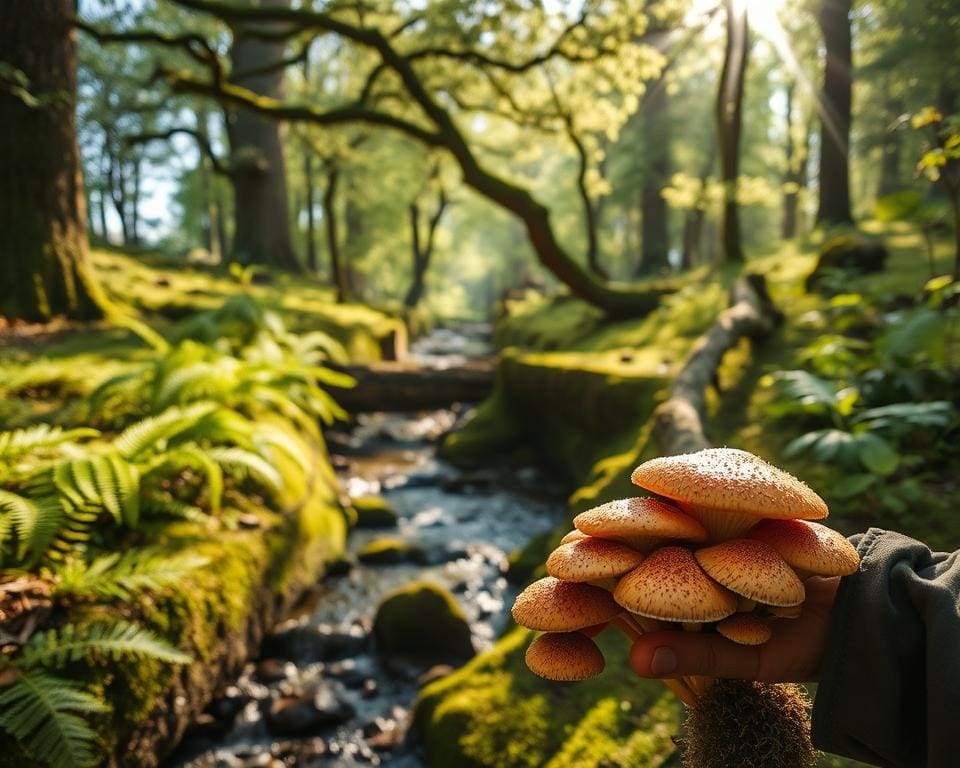Foraging in Wales is not merely a foray into the wild for sustenance; it embodies a profound connection with nature that enriches the soul. This ancient practice, which involves gathering edible plants and mushrooms, is steeped in history and tradition, fostering a sense of belonging and purpose among those who partake. In recent years, foraging has gained recognition not only for its physical benefits but also for its positive impact on mental health and overall wellbeing.
As individuals immerse themselves in the stunning Welsh landscapes, they experience a revitalising nature connection that transcends the act of gathering food. For many, the rhythmic process of foraging acts as a meditative escape from the stresses of modern life, allowing them to reconnect with themselves and the world around them. This exploration raises an important question—does foraging in Wales elevate the spirit? Through understanding its significance within local communities and its incorporation into everyday life, we begin to uncover how this practice feeds not just the body, but the soul.
The Essence of Foraging in Wales
The essence of foraging in Wales captures both a profound respect for nature and a deep-rooted connection to traditional practices. This age-old activity is more than just gathering food; it embodies a way of life that blends knowledge with appreciation of the environment. As people become more aware of sustainable living, foraging offers a pathway to reconnect with the land and understand its value.
Understanding Foraging and Its Importance
Foraging represents an art that requires patience, knowledge, and skill. Recognising edible plants and understanding their seasonal cycles is crucial. The importance of foraging stretches beyond mere sustenance. It encourages individuals to engage with their environment meaningfully, fostering a sense of community and promoting sustainable living practices. As more people embrace these ideals, they help conserve local biodiversity and support their ecosystems, ensuring that future generations can enjoy the same resources.
Traditional Foraging in Welsh Culture
In Welsh culture, traditional foraging has long been an integral part of community life. Generations have passed down techniques for gathering herbs, nuts, and wild plants, highlighting the strong legacy of this practice. Community gatherings often accompany foraging trips, where friendships are forged, stories are shared, and the cultural significance of the experience is celebrated. Through these interactions, the essence of foraging not only sustains individuals but also nurtures the community, reinforcing bonds that have stood the test of time.

Is foraging in Wales good for the soul?
Foraging in Wales transcends mere collection of wild edibles; it offers a profound spiritual connection to nature and a pathway to inner peace. Engaging with the land awakens a sense of mindfulness, allowing foragers to immerse themselves in the sights, sounds, and scents of the vibrant Welsh landscape. This act fosters not only a bond with the environment but also nurtures the soul, making it a truly enriching experience.
The Spiritual Connection to Nature
Many individuals find that foraging becomes a meditative practice, facilitating a deeper awareness of their surroundings. In the serene quiet of the woods or the gentle hum of the meadows, participants report an increased sense of being present, promoting mindfulness. This connection with nature tends to evoke feelings of gratitude and reverence, resonating deeply within one’s spirit.
Personal Stories and Experiences
Personal experiences of foragers in Wales often highlight its foraging benefits. One individual shared how a simple morning spent collecting wild garlic transformed a stressful week into a joyful embrace of life. Another recounted how discovering edible mushrooms ignited a newfound appreciation for the ecological richness surrounding them. These anecdotes reveal a common thread: foraging creates emotional connections not just to the land but also to one’s self, promoting healing and fulfilment amid the chaos of daily life.
Benefits of Foraging for Mental Health
Foraging presents a unique opportunity to connect with nature while fostering mental health benefits. Engaging in this activity not only brings the joy of discovery but also provides significant strategies for reducing stress and anxiety. Spending time outdoors naturally enhances mood and encourages a greater sense of calm, making foraging an excellent practice for psychological wellbeing.
Reducing Stress and Anxiety
Research increasingly shows that foraging can be an effective method of anxiety relief. Being immersed in natural surroundings can positively impact mental health, leading to a reduction in stress levels. Engaging the senses while gathering wild edibles helps individuals shift their focus from daily worries to the present moment. This direct interaction with the environment fosters a sense of peace, allowing participants to escape from overwhelming thoughts.
Enhancing Mindfulness Through Nature
Foraging inherently promotes enhancing mindfulness. The need to carefully observe and identify plants encourages deep focus and presence, much like a meditative practice. Participants often report feelings of joy and contentment as they engage with their surroundings. The rhythmic action of gathering prevents the mind from wandering, creating a state of flow that is both calming and enriching. Many have incorporated foraging into their mental health routines, appreciating its profound effects on their overall wellbeing.
Sustainable Living Through Foraging
Foraging offers a unique pathway to sustainable living by seamlessly integrating nature’s bounty into our daily lives. This practice encourages individuals to engage with their surroundings in a thoughtful manner, fostering an appreciation for the environment. Eco-friendly foraging is central to this approach, enabling foragers to make mindful choices that benefit both themselves and the planet.
Eco-Friendly Practices in Foraging
Practising eco-friendly foraging involves several key principles that aim to minimize environmental impact while maximising enjoyment. Foragers should always:
- Respect biodiversity by avoiding overharvesting and ensuring that multiple species remain available.
- Only take what is needed, leaving enough for the ecosystem to thrive.
- Learn about the local ecosystem to understand the intricate relationships between plants and wildlife.
- Follow regional guidelines and foraging laws to promote responsible harvesting practices.
The Role of Foraging in Conservation
Foraging plays a significant role in broader conservation efforts. By connecting individuals with their local environments, foraging fosters a sense of stewardship towards nature. This practice contributes to habitat preservation and supports the delicate balance within ecosystems. Engaging in responsible foraging cultivates ethical interactions with the natural world, making every experience a step toward conservation.
Foraging as an Outdoor Activity
Foraging serves as an exceptional outdoor activity that deeply enriches lives through community bonding and shared experiences. Families and individuals come together, exploring the abundance of nature while cultivating vital social connections. The thrill of discovering edible plants not only enhances knowledge but also strengthens relationships, creating lasting memories.
Creating Community and Social Bonds
Joining foraging groups provides an opportunity to meet like-minded people who share a passion for the outdoors. These groups foster community bonding by encouraging participants to learn from one another. Engaging in foraging adventures leads to meaningful conversations, laughter, and the joy of discovering hidden gems in local landscapes. Such experiences nurture relationships and develop a sense of belonging, making it a popular choice for those seeking social engagement.
Family-Friendly Foraging Adventures
Foraging offers a family-friendly way to spend quality time outdoors. Parents can teach their children about the natural environment, sharing essential knowledge about plants, their uses, and the importance of sustainability. Organised workshops and guided foraging trips enhance the experience, making it accessible for families of all skill levels. The opportunity to learn together, coupled with the excitement of exploration, adds a unique dimension to family outings that create cherished memories.
Connecting with Nature and Wellbeing
Foraging offers a unique pathway to deepen our connection with nature, profoundly impacting personal wellbeing. Engaging in this age-old practice allows individuals to establish a direct relationship with their environment, inviting both physical movement and mental clarity. The foraging benefits extend beyond just gathering wild food; they create moments of mindfulness where one can appreciate the simple pleasures of life, thus enhancing overall holistic health.
Nature therapy through foraging fosters resilience and boosts self-esteem, as the act of gathering creates a sense of achievement and belonging. This relationship with the earth cultivates an intrinsic understanding of one’s place within the ecosystem, offering a therapeutic escape from the stresses of modern life. As individuals reconnect with the land, they often experience a renewed sense of joy and peace, essential for nurturing personal wellbeing.
Incorporating foraging into daily routines can enhance both personal growth and healing. Consider scheduling regular outdoor excursions to local parks or woodlands to explore edible plants and herbs. This commitment to the natural world encourages an appreciation of seasonal changes and promotes a holistic approach to health. Ultimately, foraging can be a transformative experience that enriches lives, reminding us of the powerful connection we have with nature.









